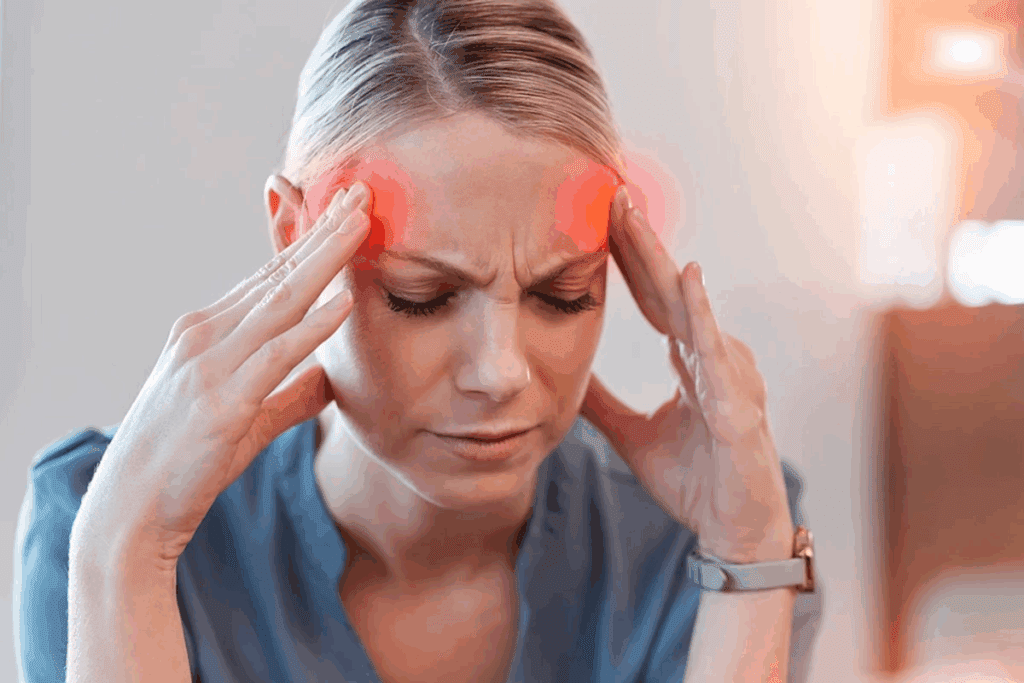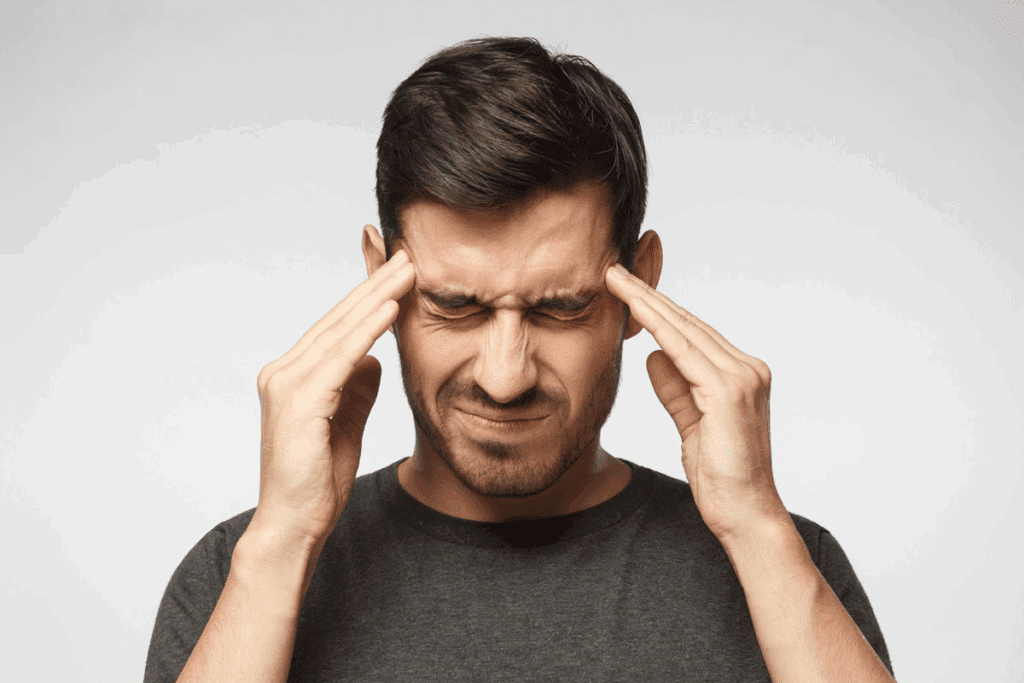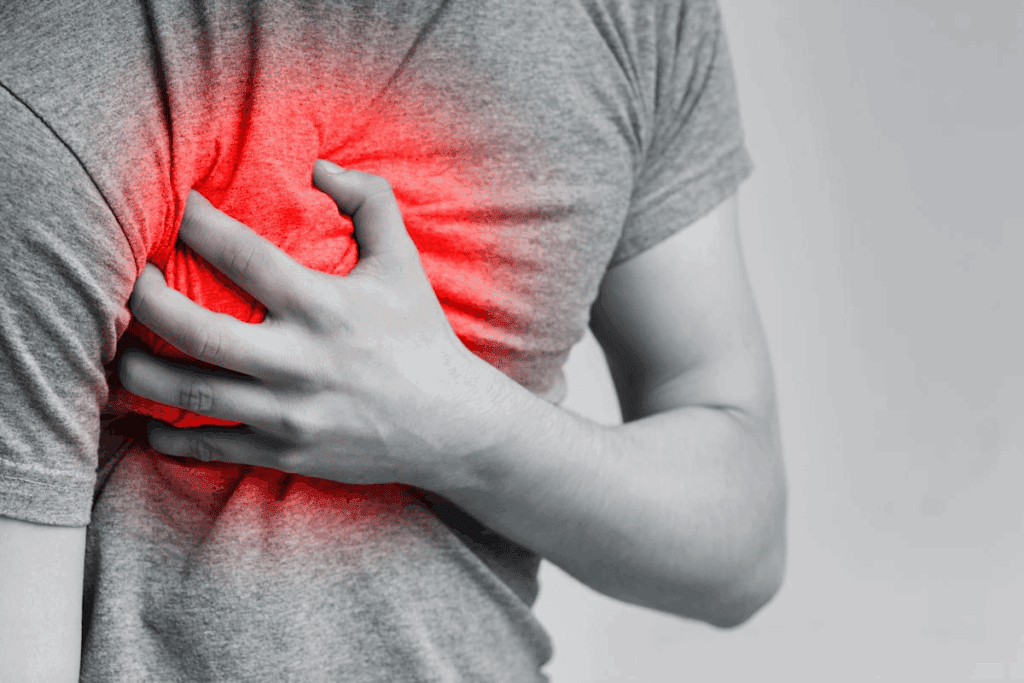Last Updated on November 25, 2025 by Ugurkan Demir

Feeling chest pain and headache at the same time can be scary. It might mean you have a serious health issue, like heart problems or brain disorders.Understand why chest and head pain occur together and when it’s time to seek urgent care.
At Liv Hospital, we use the latest medical methods to help our patients. Our team is all about giving you the best care. We focus on you, using the latest research to guide our treatment.
There’s a rare condition called cardiac cephalgia. It happens during heart attacks and causes chest discomfort and headache. It’s important to know what’s causing your symptoms and when to get help.

It’s important to understand how chest pain and headaches are connected. These symptoms can show up together in many health issues. This means we need a detailed look to find out why.
Chest pain and headaches can happen together for many reasons. This includes things like migraines and other health problems. When they do, it might feel like a headache heavy chest or headache and chest heaviness.
How people feel these symptoms can be different. Some might feel chest pressure with a headache. Others might feel a general discomfort. Knowing these differences helps doctors figure out what’s really going on.
Every year, 5.5 million people go to the doctor for chest pain. But, most of the time, it’s not because of heart problems. This shows how tricky it can be to figure out what’s causing chest pain and headaches together.
Studies say these symptoms can come from many places. This includes the brain, heart, and lungs. So, doctors have to do a lot of checking to find out why someone has headache and chest pressure.

Chest and head pain together can signal serious heart problems. These issues need quick medical help to avoid serious harm.
Cardiac cephalgia is a rare but serious condition. It happens when a heart attack disrupts blood flow, causing headaches. Seeing chest pain and headache together can mean a heart attack is happening, so get help fast.
Hypertension shows up in different ways, like chest and head pain. High blood pressure can strain the heart and cause chest pain. It can also lead to headaches by putting too much pressure on brain blood vessels. Managing high blood pressure well is important to ease these symptoms.
Arrhythmias, or irregular heartbeats, can cause chest pain and headaches. An irregular heartbeat can reduce blood flow to the brain, leading to headaches. It’s critical to find and treat the arrhythmia to manage these symptoms.
Knowing the heart-related reasons for chest and head pain is key to getting the right treatment. Recognizing the seriousness of these symptoms helps people get medical help quickly. This can prevent serious problems.
It’s important to understand the neurological causes of chest and head pain. These symptoms can come from various conditions. We’ll look at the different neurological disorders that can cause these pains.
Migraines are a neurological disorder that can cause headaches, nausea, and light sensitivity. Some people also experience chest pain during migraines. Studies show that women and people assigned female at birth are more likely to have nausea with migraines, which can include chest discomfort.
The exact reason for migraine-related chest pain is not known. But it’s thought to be linked to how our brains process pain. Treatment for migraines usually involves lifestyle changes and medications to reduce symptoms.
Panic attacks and anxiety disorders can also cause chest and head pain. During a panic attack, people may feel rapid heartbeat, sweating, and a sense of impending doom or death, along with chest tightness or pain.
These symptoms can be very distressing. They may lead to more anxiety, creating a cycle that’s hard to break. Treatment often includes cognitive-behavioral therapy (CBT) and, in some cases, medication.
The autonomic nervous system (ANS) controls our body’s automatic functions, like heart rate and blood pressure. When the ANS doesn’t work right, it can cause symptoms like chest pain and headaches. Conditions like postural orthostatic tachycardia syndrome (POTS) can make heart rate go up fast when standing, leading to headaches and chest discomfort.
Managing ANS dysfunction often means making lifestyle changes. This includes drinking more water, exercising, and avoiding triggers. Sometimes, medication is needed to help control heart rate and blood pressure.
Respiratory and infectious diseases can cause both chest and head pain. This makes it hard to diagnose. These symptoms often point to serious health issues that need quick medical attention.
Legionnaires’ disease is a bacterial infection caused by Legionella pneumophila. It can lead to severe respiratory symptoms like chest pain and headache. It’s often linked to contaminated water and can also cause fever, cough, and shortness of breath.
A study in the New England Journal of Medicine stressed the need to recognize Legionnaires’ disease. It said, “Legionnaires’ disease should be considered in the differential diagnosis of pneumonia, specially in patients with severe disease or unusual epidemiologic features.”
“The diagnosis of Legionnaires’ disease requires a high index of suspicion, specially in outbreaks or in patients with underlying health conditions.”
Pulmonary hypertension is high blood pressure in the arteries that supply blood to the lungs. It can cause chest pain, headache, and shortness of breath. This condition can be idiopathic or linked to other diseases like connective tissue disorders and thromboembolic disease.
| Symptoms | Characteristics |
| Chest Pain | Often described as tightness or pressure |
| Headache | Can be due to hypoxia or associated conditions |
| Shortness of Breath | Dyspnea on exertion or at rest |
Asthma is a chronic respiratory condition. It causes inflammation, airway obstruction, and spasm of the bronchial tubes. Symptoms include wheezing, cough, chest tightness, and shortness of breath. Severe asthma attacks can cause significant chest pain and, in some cases, headache due to hypoxia or the stress response.
Managing asthma effectively involves avoiding triggers, using the right medications like inhalers, and monitoring symptoms. “Asthma control is key to prevent complications and improve quality of life,” as guidelines emphasize.
In conclusion, respiratory and infectious causes of chest and head pain include Legionnaires’ disease, pulmonary hypertension, and asthma. Understanding these causes is vital for accurate diagnosis and effective treatment.
Stress and physical symptoms like headache and chest ache are linked in complex ways. Stress can show up in many forms, causing discomfort in both the chest and head.
Psychological stress can affect our bodies in many ways. When we’re stressed, our body’s “fight or flight” response kicks in. This can lead to a faster heart rate, higher blood pressure, and tighter muscles.
This tension can cause headache and chest pain, among other symptoms.
Tension headaches are a common stress-related condition. They often feel like tightness or pressure around the head. This type of headache can also make the chest feel tight.
This combination of symptoms can be very distressing. It’s important to know that these symptoms often come from stress and anxiety.
Chronic stress can affect the body in many ways. It can lead to high blood pressure, heart disease, and chronic headaches.
It’s key to manage chronic stress to avoid these problems. This can involve making lifestyle changes, using stress management techniques, and sometimes seeking medical help.
By understanding how stress relates to symptoms like headache chest pain, we can take steps to reduce these effects. This can improve our overall well-being.
Many other conditions can cause chest pain and headaches. These symptoms can come from different reasons than heart and brain problems.
Dehydration and imbalances in electrolytes can cause headaches and chest pain. Losing too much water and essential salts can mess with our body’s functions. Symptoms include headaches from dehydration and chest pain from electrolyte imbalances affecting the heart.
To fix dehydration and electrolyte imbalances, you should:
Gastrointestinal problems can feel like chest pain and headaches. Acid reflux from conditions like GERD can cause chest pain. It’s easy to think it’s heart trouble.
Some common stomach issues that can cause chest pain are:
Muscle and bone problems can also cause chest pain and headaches. Inflammation of the cartilage between the ribs and breastbone, known as costochondritis, can be very painful. Physical strain or injury can also cause both chest and head pain.
To ease muscle and bone chest pain, try:
Knowing these causes can help find the right treatment. Always see a doctor for a proper check-up and diagnosis.
The way to treat chest and head pain changes based on the cause. It’s important to find out what’s causing these symptoms.
For heart-related causes, treatments aim to fix the heart problems. This might include:
For example, if you have heart pain during a heart attack, you need quick medical help. Doctors might use thrombolysis or PCI to get blood flowing again.
Neurological causes need specific treatments. For migraines with chest pain, the approach includes:
Panic attacks and anxiety might need a mix of therapy and medicine. This could be CBT and drugs like benzodiazepines or SSRIs.
Some lifestyle changes can help with chest and head pain, no matter the cause. These include:
Also, drinking enough water and getting enough sleep can prevent dehydration and electrolyte issues that might cause these symptoms.
Knowing the cause of chest and head pain and using the right treatment can help manage symptoms. This can greatly improve one’s quality of life.
It’s key to know when to get help fast if you have both chest and head pain. Some signs mean you need urgent care. Knowing how to act can save lives.
Some signs need quick action. These include:
Not all chest and head pain needs emergency care. But, it’s better to be safe. If you see red flag symptoms, get help right away. For milder cases, consider these factors:
When you call for help or go to the ER, share all your symptoms. Tell them:
Being ready and sharing the right information helps responders help you fast. This is true for “heavy chest headache,” “chest pain headache,” or “headache and chest pain.”
To prevent chest and head pain, manage health issues, lower stress, and live a healthy lifestyle. Knowing what causes these pains helps people take action to lessen their symptoms.
Managing these symptoms long-term needs a mix of strategies. Eating well, staying active, and using stress-relief methods like meditation or yoga are key. These habits help keep symptoms under control.
If you often or severely experience chest pain and headaches, or both, see a doctor. They can help create a plan just for you. This plan can lower your risk of serious problems and make life better.
It’s vital to get medical help if your symptoms don’t go away or get worse. Quick action can greatly help in managing and preventing these pains. This way, people can enjoy a healthier, happier life.
Chest pain and headache can be caused by many things. This includes heart problems like cardiac cephalgia and arrhythmias. It also includes brain issues like migraines and panic attacks.
Respiratory and infectious diseases, like Legionnaires’ disease, can also cause these symptoms.
If you have severe chest pain or trouble breathing, get help right away. Also, seek medical help if you have a bad headache with confusion, dizziness, or weakness.Look out for other warning signs. These include chest pain that spreads to your arm, neck, or jaw. Or a headache with fever, stiff neck, or vomiting.
Yes, stress can make you feel physical pain like chest pain and headaches. Tension headaches and stress can make these symptoms worse. Long-term stress can also make health problems worse.
Treatment depends on the cause. For heart problems, treatments might include medicines, angioplasty, or surgery. For brain issues, treatments could be medicines, lifestyle changes, or therapy.Changing your lifestyle, like managing stress, exercising, and eating right, can also help.
To prevent these symptoms, manage your health and live a healthy lifestyle. This means exercising regularly, eating well, staying hydrated, and reducing stress. Techniques like meditation or deep breathing can help too.
Get help right away if you have severe symptoms. This includes chest pain with trouble breathing, or a bad headache with confusion. Also, watch out for red flag symptoms like pain spreading to your arm, neck, or jaw.
When you call for emergency help, tell them everything about your symptoms. Mention when they started, what makes them better or worse, and any health history. This helps responders quickly help you.
Yes, not having enough water can lead to chest pain and headaches. It can also cause electrolyte imbalances. Drinking enough water and eating well can help avoid these symptoms.
Yes, making lifestyle changes can help. This includes exercising regularly, managing stress, and eating a balanced diet. Avoiding things that trigger your symptoms, like certain foods or environments, can also help.
Subscribe to our e-newsletter to stay informed about the latest innovations in the world of health and exclusive offers!